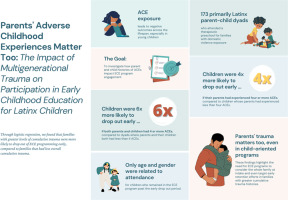
New Research Reveals How Parental Childhood Trauma Can Perpetuate Abuse—And Suggests Solutions
A revolutionary study by researchers from Japan has illuminated the intricate psychological mechanisms that may clarify why some parents who endured trauma in their own childhoods are predisposed to mistreat their children. Published in Scientific Reports on March 5, 2025, this research offers vital insights that could guide targeted interventions aimed at breaking the cycle of abuse across generations.
Directed by Yuko Kawaguchi from the University of Fukui, the research team sought to provide a more comprehensive understanding of child maltreatment beyond the simplistic distinction of abusive versus non-abusive parents. They aimed to analyze how personal experiences of trauma, emotional processes, and mental health interrelate to influence parenting practices.
An Unexpected Link Between Trauma, Empathy, and Parenting
The research involved 55 mothers—13 who had exhibited child maltreatment behaviors and 42 who had not—utilizing a method called path analysis. This sophisticated statistical approach reveals how various factors interact with each other, allowing researchers to track indirect and interconnected relationships.
Their findings challenge established beliefs: in contrast to previous studies indicating that individuals who were abused lack empathy, mothers with a traumatic childhood background expressed increased levels of emotional empathy—specifically a type known as “personal distress.”
Personal distress refers to a self-centered emotional response to the pain of others, characterized by becoming overwhelmed by the emotions of others, potentially compromising the ability to react supportively or constructively. While empathy is typically viewed as a protective factor against abuse, this specific type of emotional strain may heighten susceptibility to negative parenting actions.
The Influence of Depression on Parenting Techniques
Another significant finding indicates that this increased emotional empathy may exacerbate depressive symptoms in certain mothers. These depressive symptoms, in turn, affected their parenting, though the relationship proved to be complex.
Co-author Dr. Takashi X. Fujisawa, also from the University of Fukui, noted that mothers displaying moderate depressive symptoms were more inclined to adopt excessive disciplinary tactics. Fascinatingly, those with severe depression showed a reduced likelihood of engaging in such behaviors, possibly due to emotional disengagement or passivity.
This non-linear pattern implies that moderate depression may represent a particularly risky condition where heightened emotional awareness paired with diminished coping skills can lead to aggressive or harmful outbursts in parenting.
Comprehending the Cycle: From Early Trauma to Parenting Difficulties
This research adds a valuable dimension to existing studies showing that childhood abuse can hinder emotional development. Prior research suggested that maltreated children might show reduced empathy by age eight—an impairment that can carry into adulthood. Kawaguchi and her colleagues propose that some survivors of trauma may instead cultivate heightened emotional sensitivity, which, when combined with mental health issues, contributes to parenting difficulties later on.
Tackling the Underlying Issues – What Actions Can Be Taken?
The key takeaway from this research lies not only in identifying the issue but also in outlining potential solutions.
“The heightened emotional empathy we found seems to predispose these individuals to depression, which subsequently affects their parenting behavior,” Kawaguchi stated. “By creating mental health resources that focus on both emotional processing and depressive symptoms, we might be able to stop patterns of maltreatment from being handed down through generations.”
This finding opens avenues for more targeted interventions. Instead of general parenting workshops or standard empathy training, mental health practitioners could focus on teaching emotional regulation skills and treating depressive symptoms among at-risk parents—especially those with traumatic pasts.
Study Limitations and Future Directions
Despite its limited sample size (only 13 mothers in the maltreatment category), the study provides a rare and valuable perspective on an often-overlooked and sensitive population. The authors recognize that self-reported data and sample size may constrain the applicability of the conclusions. Nevertheless, the thorough psychological analysis lays a solid groundwork for future research.
Encouragingly, the team from the University of Fukui is already advancing toward practical applications of their findings. They are in the process of incorporating these psychological insights into early intervention programs aimed at parents with known trauma histories.
Wider Implications for Child Welfare Systems
For professionals in child welfare and mental health, this research highlights the crucial need to address a parent’s emotional health—not just concerning parenting techniques, but also their mental health background and capacity to manage intense emotions.
If effectively implemented, such strategies could disrupt a cycle that has troubled many families: the inadvertent and tragic transmission of trauma across generations. With a deeper comprehension of the pathways connecting childhood abuse to parental maltreatment, there exists renewed optimism that intervention programs can be crafted to not only shield children—but also facilitate healing for their parents.
Funding for the research was provided by several Japanese public health and research organizations, including the Japan Society for the Promotion of Science and the Japan Agency for Medical Research and Development.
As the research community continues to delve into the emotional ramifications of childhood trauma, this study serves as an important reminder that empathy, while foundational